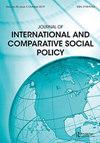The clandestine welfare: The role of illicit actors in the provision of social protection in Latin America
Q2 Social Sciences
Journal of International and Comparative Social Policy
Pub Date : 2023-11-23
DOI:10.1017/ics.2023.10
引用次数: 0
Abstract
There has been an increasing interest in exploring the different types of welfare regimes in middle- and low-income countries. However, most of the studies so far seem to neglect the importance of illicit groups as welfare providers. Illicit groups can be so powerful in many of these societies, that they can create extensive social safety nets embedded in parallel governance orders. Considering their importance as fundamental actors in the Global South, it is required to acknowledge their role as welfare deliverers as a missing piece in the literature. Hence I discuss the nature of what I call “clandestine welfare” and three specific forms of social protection provided by illicit groups: direct, involuntary, and forced. In the first form, the illicit groups provide directly to society by delivering goods or services that the formal state fails to provide. In the second, the illicit group’s activities have involuntary but positive spill-overs over society in terms of welfare. In the last one, the illicit groups use violence to force other social actors to provide social protection. By bringing illustrative examples from Latin America, I aim to show that the action of illicit groups represents a tangible source of welfare for a large segment of the population that goes beyond charity.秘密福利:拉丁美洲非法行动者在提供社会保护方面的作用
人们对探索中低收入国家不同类型的福利制度越来越感兴趣。然而,迄今为止的大多数研究似乎都忽视了非法团体作为福利提供者的重要性。在许多这样的社会中,非法团体的力量如此强大,以至于它们可以在平行治理秩序中建立广泛的社会安全网。考虑到他们作为全球南部基本行动者的重要性,有必要承认他们作为福利提供者的角色是文献中缺失的一部分。因此,我将讨论我所称的 "秘密福利 "的性质以及非法团体提供社会保护的三种具体形式:直接、非自愿和强迫。在第一种形式中,非法团体通过提供正规国家未能提供的商品或服务,直接向社会提供社会保护。第二种形式是,非法团体的活动对社会产生非自愿但积极的福利溢出效应。最后一种情况是,非法团体利用暴力迫使其他社会行为者提供社会保护。通过列举拉丁美洲的实例,我旨在说明非法团体的行动是为大部分人口提供福利的一个有形来源,它超越了慈善的范畴。
本文章由计算机程序翻译,如有差异,请以英文原文为准。
求助全文
约1分钟内获得全文
求助全文
来源期刊

Journal of International and Comparative Social Policy
Social Sciences-Sociology and Political Science
CiteScore
3.70
自引率
0.00%
发文量
18
 求助内容:
求助内容: 应助结果提醒方式:
应助结果提醒方式:


